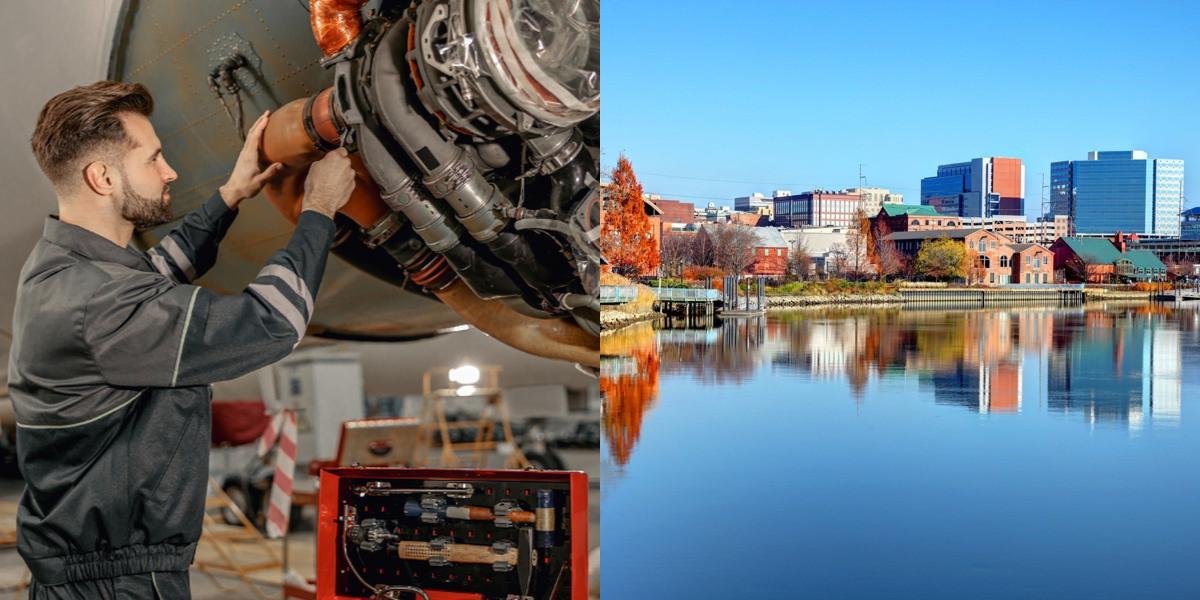How to Become an Aviation Mechanic in Delaware

Aviation mechanics, also known as aircraft mechanics or aircraft maintenance technicians, are professionals responsible for inspecting, repairing, and maintaining aircraft to ensure they are safe and in optimal working condition. Their responsibilities include performing regular maintenance checks, troubleshooting and diagnosing mechanical issues, repairing or replacing faulty parts, and documenting all work performed.
How do I get a job as an Aviation Mechanic?
After obtaining your aviation mechanic certification, the next step is to find a job in the industry. Here are some steps you can take to increase your chances of getting hired as an aviation mechanic:
-
Build a strong resume: Your resume is your first opportunity to make a good impression on potential employers. Highlight your education, training, and practical experience in aircraft maintenance. Include any relevant certifications, licenses, or specialized training you have obtained. If you have worked on specific types of aircraft or have experience with certain maintenance procedures, make sure to mention them. Also, emphasize any problem-solving skills, attention to detail, and ability to work in a team that are essential for aviation mechanics.
-
Network with industry professionals: Networking is a powerful tool for finding job opportunities. Attend industry events, join professional organizations, and connect with aviation mechanics and professionals on social media platforms like LinkedIn. Building relationships with industry professionals can help you stay informed about job openings and gain valuable insights and advice.
-
Apply for entry-level positions: When starting your career as an aviation mechanic, it is common to begin with entry-level positions that provide on-the-job training and mentorship. Look for job openings at maintenance facilities, repair stations, airlines, and aircraft manufacturers. Apply for positions that align with your specialization and career goals. Even if the job description asks for more experience than you currently have, it is still worth applying as you may be considered based on other qualifications and your willingness to learn.
-
Prepare for interviews: Once you start getting interview offers, it is important to prepare thoroughly to make a good impression on potential employers. Research the company and its operations, familiarize yourself with common interview questions, and practice your answers. Be prepared to demonstrate your technical knowledge, problem-solving skills, and ability to work under pressure. Dress professionally and bring copies of your resume and any relevant certifications or licenses.
-
Continuously improve your skills: The field of aviation is constantly evolving, and it is important to stay up to date with the latest advancements and regulations. Take advantage of opportunities for professional development, such as attending workshops, seminars, and training programs. Consider pursuing additional certifications or specialized training to enhance your skills and make yourself more marketable to potential employers.
Career Paths and Opportunities after Becoming an Aviation Mechanic
Becoming an aviation mechanic opens up a wide range of career paths and opportunities in the aviation industry. Here are some potential career paths you can consider after obtaining your aviation mechanic certification:
-
Aircraft Maintenance Technician: As an aircraft maintenance technician, you will be responsible for inspecting, repairing, and maintaining aircraft to ensure they meet safety and performance standards. You may work for airlines, maintenance facilities, repair stations, or aircraft manufacturers. With experience and additional certifications, you can advance to more senior positions, such as lead technician or maintenance supervisor.
-
Avionics Technician: Avionics technicians specialize in the electrical and electronic systems of aircraft. They install, troubleshoot, and repair communication, navigation, and monitoring systems. Avionics technicians work with advanced technology and require specialized knowledge and skills. This specialization can open up opportunities in avionics repair stations, airlines, or avionics equipment manufacturers.
-
Quality Control Inspector: Quality control inspectors ensure that aircraft maintenance and repair work meets regulatory and quality standards. They perform inspections, audits, and tests to identify any issues or deviations from the required standards. Quality control inspectors play a crucial role in maintaining the safety and airworthiness of aircraft. This career path requires attention to detail, strong analytical skills, and knowledge of aviation regulations.
-
Aircraft Manufacturing: With your aviation mechanic certification, you can also explore opportunities in aircraft manufacturing. Aircraft manufacturers require skilled mechanics to assemble, test, and troubleshoot aircraft during the production process. This career path allows you to work on cutting-edge aircraft and be involved in the development of new technologies.
-
Specialized Maintenance: Depending on your interests and specialization, you can also pursue specialized maintenance roles. For example, you can become a helicopter mechanic, working on helicopters used in emergency medical services or search and rescue operations. Alternatively, you can specialize in maintaining specific types of aircraft, such as commercial jets, military aircraft, or private planes.
-
Management and Supervisory Roles: With experience and additional training, you can advance to management and supervisory roles in aircraft maintenance. These roles involve overseeing a team of mechanics, coordinating maintenance schedules, and ensuring compliance with regulations and safety standards. Management positions often require strong leadership and communication skills, as well as a thorough understanding of aircraft maintenance operations.
Final Thoughts
Becoming an aviation mechanic is an exciting and rewarding career choice for those with a passion for aircraft and mechanics. By completing the necessary education and training, gaining practical experience, and obtaining your aviation mechanic certification, you can embark on a career in the aviation industry. There are numerous opportunities for career growth and advancement, and with continuous learning and professional development, you can stay ahead in this dynamic field. So, if you're ready to take flight in your career, start exploring the path to becoming an aviation mechanic today!
Dreambound offers a window into various career paths, so if you're considering a shift in your career, browse through these articles:

Fel is a student support representative who guides enrollees to the right program and answers their queries. She's committed to helping students and takes pride in her work. In her free time, she enjoys sightseeing and hanging out with loved ones.




